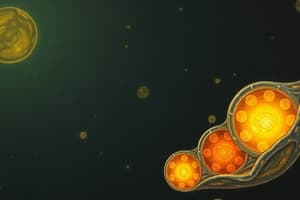Podcast
Questions and Answers
What are the primary phases present in early embryonic cell cycles and how do they differ from those of adult cells?
What are the primary phases present in early embryonic cell cycles and how do they differ from those of adult cells?
Early embryonic cell cycles consist of short S phases and M phases, lacking G1 and G2 phases, whereas many adult cells, such as nerve cells, may cease division altogether.
What role do growth factors play in the progression of the animal cell cycle?
What role do growth factors play in the progression of the animal cell cycle?
Growth factors regulate the cell cycle progression at the restriction point in late G1, and their absence causes cells to enter the G0 phase.
Describe the function of cell cycle checkpoints.
Describe the function of cell cycle checkpoints.
Cell cycle checkpoints are control mechanisms that ensure proper progression of the cell cycle by detecting DNA damage and issues during chromosome attachment.
What is the G0 phase, and why might a cell enter this stage?
What is the G0 phase, and why might a cell enter this stage?
How does the rapid division of embryonic cells contribute to early development?
How does the rapid division of embryonic cells contribute to early development?
Flashcards
Embryonic cell cycle
Embryonic cell cycle
Rapid cell division in early embryos, without G1 or G2 phases, consisting of short S and M phases.
G0 phase
G0 phase
Quiescent stage of the cell cycle. Cells are metabolically active but not dividing.
Cell cycle checkpoints
Cell cycle checkpoints
Control points in the cell cycle that monitor DNA integrity and spindle attachment ensuring proper chromosome transmission.
Cell cycle regulation
Cell cycle regulation
Signup and view all the flashcards
Restriction point (in G1)
Restriction point (in G1)
Signup and view all the flashcards
Study Notes
Cell Cycle Overview
- The cell cycle is a series of events leading to cell duplication and division.
- In bacteria, cell growth and DNA replication occur throughout the cycle.
- In eukaryotes, DNA replication happens in a specific phase, and distributed to daughter nuclei in a complex series that precedes cell division.
- The eukaryotic cell cycle has four coordinated processes:
- Cell growth
- DNA replication
- Distribution of duplicated chromosomes to daughter cells
- Cell division
Eukaryotic Cell Cycle Phases
- Eukaryotic cell cycles are divided into four phases: M, G1, S, and G2.
- M phase involves mitosis (followed by cytokinesis).
- Interphase encompasses G1, S, and G2 phases, during which cell growth occurs.
- A typical human cell cycle takes about 24 hours.
- G1: about 11 hours
- S: about 8 hours
- G2: about 4 hours
- M: about 1 hour
- The duration of these phases can differ based on many factors.
- Some cells, like budding yeasts, complete the cycle in 90 minutes.
- Early embryo cells can have even shorter cycles (30 minutes or less).
- Adult cells like nerve cells may cease dividing altogether.
Cell Cycle Regulation
- Cell cycle progression is regulated by external signals from the environment as well as internal signals that monitor and coordinate various processes in different phases.
- The animal cell cycle is controlled by growth factors at a restriction point during late G1.
- If growth factors are lacking, cells enter a quiescent stage G0.
- Checkpoints are essential control mechanisms that ensure proper progression.
- Checkpoints monitor DNA for damage and ensure complete genomes are transferred to daughter cells.
Cell Cycle Checkpoints
- Checkpoints detect problems like DNA damage (due to external agents or replication errors) and chromosome attachment issues to the mitotic spindle.
- Checkpoint malfunction can lead to uncontrolled cell growth and potentially cancer.
- The G1/S checkpoint (restriction point) regulates entry into DNA replication(S) phase.
- Intra-S checkpoint controls DNA replication.
- G2/M checkpoint determines the integrity of replicated DNA before mitosis.
- Spindle assembly checkpoint ensures all chromosomes are attached correctly to the mitotic spindle before proceeding to anaphase.
Regulators of Cell Cycle Progression
- Progression through checkpoints is largely determined by the activation of cyclin-dependent kinases (Cdks) by proteins called cyclins.
- Cyclins and Cdks are present throughout the cell cycle but only become active when associated.
- Different forms of cyclins are present at specific stages to regulate.
- Humans have multiple Cdks, one important one is p34cdc2, now termed Cdk1, crucial for G2→M transition in animal cells.
- Cdk2, Cdk4, and Cdk6 are involved in passing restriction point in G1.
- Cdk7 is involved in activating other Cdks, RNA transcription, and DNA repair.
- Other Cdks participate in different processes.
- Restriction of DNA replication to once per cell cycle is achieved with MCM proteins binding to origin of replication complexes (ORC) during G1.
- The association of MCM proteins with DNA during S, G2, and M phases is blocked by protein kinases.
- MPF (Maturation Promoting Factor) is a key dimer consisting cyclin B and Cdk1, triggers G2 to M transition.
- The control of G1 progression is managed by pRb/E2F and CDK4/CDK6, allowing E2F to allow protein production required for DNA replication.
The Events of M Phase (Mitosis)
- Mitosis stages:
- Prophase
- Prometaphase
- Metaphase
- Anaphase
- Telophase
- Cytokinesis (division of the cytoplasm) follows mitosis.
- Stages of mitosis in animal cells (detailed steps described.)
- Cdk1/cyclin B and progression to metaphase (targets of this complex detailed)
- The Spindle Assembly Checkpoint (SAC) to prevent premature anaphase before chromosomes are properly aligned on metaphase.
- The spindle assembly checkpoint is mediated by Mad/Bub proteins that bind to Cdc20, a required component of the anaphase-promoting complex, and the process of checkpoints to ensure cells are prepared to enter anaphase and complete mitosis.
Studying That Suits You
Use AI to generate personalized quizzes and flashcards to suit your learning preferences.




